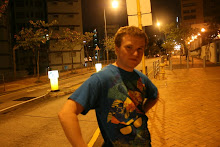First off, let me comment on what a pretentious rant my last post was! Sometimes, I truly do wonder what I'm thinking when I write these things. Then again, the point of "blogging" is not to come up with a clearly thought-out, consistent essay, but a clearly articulated "blurb" or some other kind of representation of thought.
Anyway, aside from the Orwell piece, the Schrawtz essay was my favorite thus far. The essay, more like a novel or a memoir, is set-up like a movie, with different chunks representing different progressing scenes, or progression's in the author's maturity. I found it odd that Schrawtz calls her father a "hick" early on- clearly he's not, but that maturity comes later on when she's visited Rindhiem with her family.
As for me, I barely noticed the blocks of text. Before I even realized that they were there, I knew as I was reading the essay that certain parts had their own significance, like the author's considering her father a "hick" or the transformed father playing golf and saying things like "you're lucky to be here."
But, as I'm made to think about it, the blocks represent episodes. Things that say, "although this is all related, this part in important for special consideration as it has it's makes it's own special contribution to the rest of the work."
P.S. ASchwartz' essay and other's like them don't represent self-absorbed stuff I mentioned in my previous post, in my opinion. I liked it quite a bit. She and her father were the focus, but it had overarching themes about immigration, nostalgia, personal maturity, and national pride. I think that's what creative nonfiction should always have, even if it's autobiographical.
Saturday, September 19, 2009
Subscribe to:
Comments (Atom)
